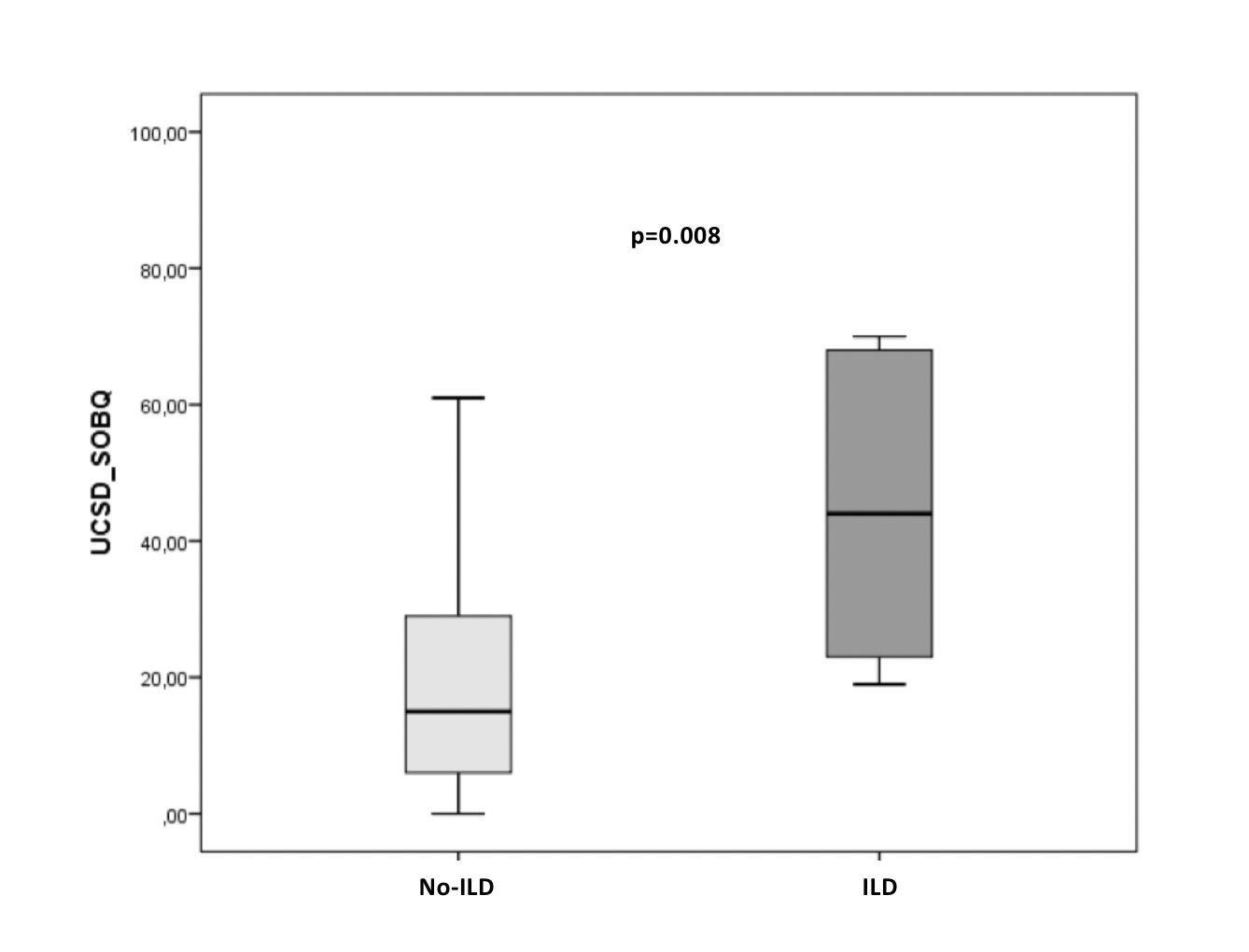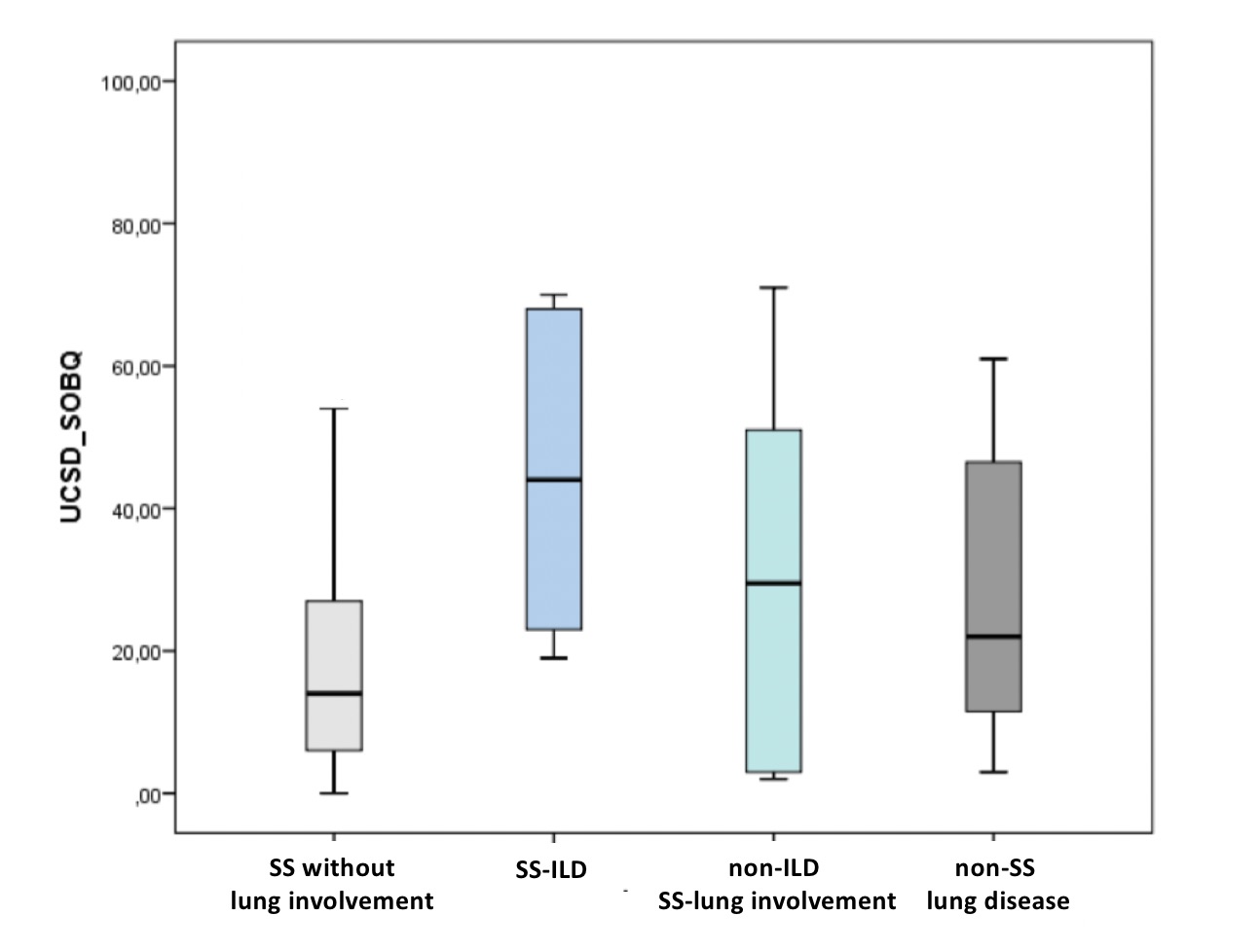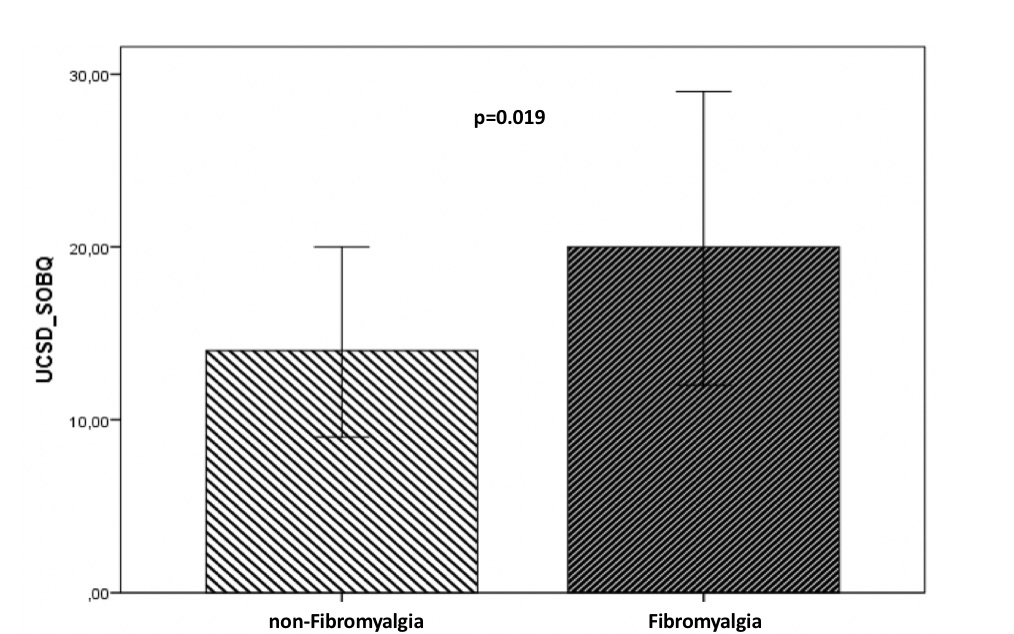Session Information
Date: Monday, November 13, 2023
Title: (1365–1382) Sjögren’s Syndrome – Basic & Clinical Science Poster I
Session Type: Poster Session B
Session Time: 9:00AM-11:00AM
Background/Purpose: In clinical trials investigating new drugs for the management of Interstitial Lung Disease (ILD) patient reported outcomes (PRO) are increasingly employed as outcome measures in addition to objective pulmonary function tests (PFT). The UCSD Shortness of Breath Questionnaire (UCSDSOBQ) is a domain-specific PRO for the evaluation of dyspnea. It has been recently validated in a large cohort of patients with fibrotic ILD of various etiologies. However, assessing dyspnea in Sjögren’s Syndrome (SS) patients is especially challenging since it can be caused by both ILD and airway disease, ranging from xero-trachea to small airway involvement.
Aims: 1) to assess the impact of dyspnea in SS patients by using the UCSDSOBQ; 2) to investigate the correlation of the UCSDSOBQ score with underlying lung involvement and other PRO commonly employed for the multidimensional assessment of SS.
Methods: This was an observational cross-sectional study involving consecutive Primary SS patients (2016 ACR/EULAR classification criteria) evaluated in our outpatient clinic from November 2022 to May 2023. Clinical, biological, and imaging data were registered, as well as detailed information regarding smoking and pulmonary history.
Patients were asked to compile the UCSDSOBQ, a 24-item questionnaire assessing the impact of dyspnea on common daily activities with a score from 0 (“not at all”) to 5 (“unable to do because of breathlessness”) for each question.
PRO including ESSPRI, FACIT and HADS (hospital anxiety and depression scale) were also collected.
Based on clinical history, PFT and high-resolution computed tomography, we classified patients in the following subgroups: a) absence of lung involvement; b) SS-ILD; c) non-ILD SS-related lung involvement; d) non-SS-related lung disease.
Results: 137 SS patients were enrolled, with a median age of 64 (IQ 57-72) yrs, disease duration of 7 (IQ 5-14) yrs, F:M=133:4, anti-SSA positivity in 97/137 (70.8%). 39/137 (31.7%) patients were current or past smokers. Out of 137 patients 110 (80.3%) were classified as SS without lung involvement, 6 (4.4%) as SS-ILD, 10 (7.3%) as non-ILD SS-related lung involvement and 11 (8%) as non-SS related lung disease, including bronchial asthma and COPD.
The UCSDSOBQ total score was significantly higher in SS-ILD compared to non-ILD SS patients with a median score of 44 (IQR 22-68,5) vs 15 (5,75-29,75) respectively (p=.008).
We observed a trend towards a higher median UCSDSOBQ total score in SS-ILD patients compared to those with non-ILD SS-related lung involvement. However, this difference was not statistically significant. The UCSDSOBQ total score showed a moderate correlation with ESSPRI (r=.449; p< .001), FACIT (r=.564; p< .001) and HADS (r=.417; p< .001). Finally, SS patients with comorbid fibromyalgia exhibited a higher median UCSDSOBQ total score (p= .019) compared to the remaining SS patients.
Conclusion: Dyspnea assessment in SS-ILD patient is challenging due to potential airway involvement and comorbid conditions such as chronic fatigue, anxiety and depression that may alter its perception. Despite these difficulties the UCSDSOBQ seems a promising tool both for screening of lung involvement and as an outcome measure in future clinical trials.
To cite this abstract in AMA style:
La Rocca G, Ferro F, Elefante E, Fonzetti S, Fulvio G, Navarro Garcia I, Romei C, Mosca M, Baldini C. The UCSD Shortness of Breath Questionnaire Is a Useful Tool for the Assessment of Dyspnea in Primary Sjögren’s Syndrome Patients with Interstitial Lung Disease: A Monocentric Cross-Sectional Study [abstract]. Arthritis Rheumatol. 2023; 75 (suppl 9). https://acrabstracts.org/abstract/the-ucsd-shortness-of-breath-questionnaire-is-a-useful-tool-for-the-assessment-of-dyspnea-in-primary-sjogrens-syndrome-patients-with-interstitial-lung-disease-a-monocentric-cross-sectional-s/. Accessed .« Back to ACR Convergence 2023
ACR Meeting Abstracts - https://acrabstracts.org/abstract/the-ucsd-shortness-of-breath-questionnaire-is-a-useful-tool-for-the-assessment-of-dyspnea-in-primary-sjogrens-syndrome-patients-with-interstitial-lung-disease-a-monocentric-cross-sectional-s/



